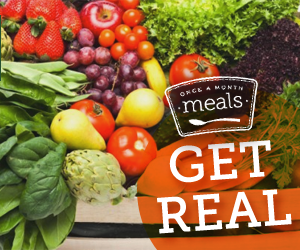**This post is part of the Get Real series. Please remember that this is meant as a learning community. We know that many of you are passionate about what you do and we want you to express that, just please do so in a way that will be an encouragement and aid to others making a transition. We want this to be a “safe space” for participants to learn. For that reason, we reserve the right to delete any comments that are not handled in this manner.
Back in June, we started the conversation about eggs, and today we return. When you purchase eggs what are you looking for? Are you concerned with what your hens were fed? Do you worry about the conditions in which the hens were raised? What terminology are you looking for on the egg carton when you are shopping? How do you find out if the hens were raised and fed the way you would approve? Just ask!
One egg-farming family I spoke with shared about their chickens’ (23 hens) living quarters. Their hens roost in a specially-designed coop on wheels (built for easy clean-ups) each night, but roam free in the yard all day, feasting on bugs, worms, grass, and whatever they find throughout the garden. Their diet is supplemented with pellets. I read another backyard chicken farmer’s account, telling about how she has a small compost pile that is kept just for her chickens, kept stocked with organic vegetable cuttings, and other small treats her hens love.
Gudrun of Kitchen Gadget Girl says: For eggs, organic eggs must be from chickens fed organic food and given access to the outdoors, and not raised in cages. The USDA does not have a legal definition of free-range chicken eggs – free-range is supposed to mean the chickens have free access to the outdoors and don’t live in cages. Cage-free birds don’t live in cages either but usually live indoors. And just because chickens are raised organically and free-range chickens have access to the great outdoors, it does not mean they use it. In a situation like this, I would try to find the most local eggs available on the shelf.
But what if you can’t find a local egg source? In the previous egg post, Kelly shared this link, which was so good I want to share it again. Take a look at the rankings, find your state, and find some egg buying options that work for you. Here’s another great link that was posted just this week from The Healthy Home Economist regarding store-bought eggs. And if you can’t find what you need to know there? My answer to almost everything: Google it! Be a responsible consumer and know from where your food is coming. Give it a try and you might be surprised.
September Week 3 Action Item:
- Spend a little time this week finding out from where your eggs came. If you purchased them from the store pull the carton out of the fridge and do some Googling. Check the Egg Scorecard. Find out all you can about where your eggs came from. If you purchased your eggs from a local farmer ask them questions about how they raise their hens, and what their farming practices are. Be an educated consumer!
September Get Real:
Please take a moment to thank our guest authors by clicking over to their sites and/or liking them on Facebook and/or Twitter.
Sponsor: Once A Month Meals
Guest Author: Gudrun of Kitchen Gadget Girl